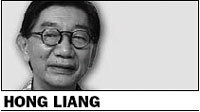Liang Hongfu
Balancing HK's big finances, small gov't
By Hong Liang (China Daily)
Updated: 2007-03-13 07:08
 |
Large Medium Small |
Shortly after the Hong Kong government announced its budget for the current fiscal year, Anthony Cheung, a member of the executive council, the policy making agency, posed the question: "Are we really all that rich?"
 By "we", Professor Cheung, a founder of the policy think tank SynergyNet, was obviously referring to the government, which has proposed, among other things, a tax rebate totaling more than HK$20 billion ($2.63 billion).
By "we", Professor Cheung, a founder of the policy think tank SynergyNet, was obviously referring to the government, which has proposed, among other things, a tax rebate totaling more than HK$20 billion ($2.63 billion).
The Hong Kong people's gratitude to Financial Secretary Henry Tang was reflected in a distinct boost in his post-budget popularity rating. But we praise the government and Tang as much for their commitment to small government, which is a cornerstone of a long-cherished economic policy.
The unexpected budgetary surplus of more than HK$55 billion ($7.24 billion) for the fiscal year ending this March 31 totaled 10 times the earlier estimates. The government did what was expected of it in returning a chunk of that money to tax payers.
There is criticism from some quarters that the government hasn't done enough to bring relief to the less well-to-do segment. But it is widely believed that the financial secretary's budget proposal, including the tax rebate, will be ratified by the legislature.
But the question raised by Cheung is not going to go away despite the wide support for the government's proposed giveaway. This is a particularly relevant question at a time of heightening public anticipation for positive government action to address various social and economic issues. The issues are arising from the widening gap between rich and poor, the perceived deterioration of the environment, ballooning cost of healthcare, and growing competition from mainland cities.
This raises another question: Can we expect our government to remain "small" if we require it to get directly involved in the redistribution of public wealth, improving our environment, pumping ever-more money into the healthcare system and directing the economy to meet the challenges from rapidly developing mainland cities?
In delivering his budget speech, Tang noted the International Monetary Fund (IMF) advice to keep the level of reserves at 30 to 50 percent of gross domestic product in anticipation of revenue fluctuations. Based on this yardstick, the estimated fiscal reserves of between HK$390 billion ($51.32 billion) to HK$580 billion ($76.32) over the next five years seem rather less than adequate.
We believe that the IMF may be too conservative in its recommendations for Hong Kong. As Cheung noted, setting the level of fiscal reserves is a matter of both economic and political judgment.
In arriving at that judgment, the Hong Kong government has shown that it has been most careful in striking a balance between public demand and fiscal discipline. What's more, it has demonstrated restraint from crowding out the private sector by sucking in too large a portion of available capital and human resources to fund public projects.
For that reason, we believe that the government's baseline of maintaining the fiscal reserves at levels sufficient to cover 12 months' expenditure to be appropriate. In this case, the projected reserves for the next five years would seem rather high.
However, we must not ignore the inherent problems of our narrow tax base although the proposed sales tax was shelved due to lack of public support. But it is widely recognized that there is a pressing need for new indirect taxes to help cover the shortfall in government revenue during an inevitable economic down-cycle.
Meanwhile, let's give the economy a further boost by freely spending the money we are getting back from the government.
(China Daily 03/13/2007 page9)
| 分享按钮 |